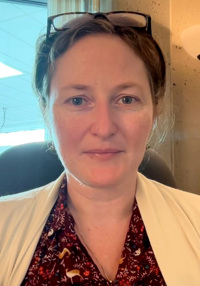The Division of Continuing Studies (DCS) has a Student Support Coordinator who provides non-academic support and resources related to being a student at Continuing Studies at UVic.
Emily Arvay (PhD) can provide mental health and wellness supports (for stress, culture-shock, anxiety, depression, grief and loss) and assistance with being a student in Victoria. Emily can also provide resources for childcare and housing, support students with documented accommodations (academic and physical), as well as assist with medical insurance questions and academic integrity concerns.
Emily recently joined the DCS team in 2025 and has previous experience working with English-as-an-additional-language learners at UVic as an TESOL-certified EAL Specialist for the Academic Skills Centre (2019–2025). Emily also has extensive experience working with UVic students with documented disabilities requiring adaptive accommodations through her work with the Centre for Accessible Learning (2017–2022). In addition to booking an in-person, phone, or Zoom appointment, keep an eye out for the wellness workshops that Emily will be facilitating throughout the year.

Student Support Coordinator
Appointments
To make an in-person, online, or phone Student Support appointment:
- Visit this booking portal: uvictoria.mywconline.net
- Click on the blue 'Log in' button to create an account.
- Select from the 'Schedules' drop-down menu the 'Student Support Coordinator' option.
- Click on any white square to book a 30-minute appointment with Emily.
- You can also stop by the Continuing Studies Building, Registration Office, room 245, to see if Emily is available for a drop-in appointment.
By email
Emailing sscoord@uvic.ca is another great way to connect with Emily. You can email Emily any questions or concerns that you might have without needing to make an appointment first. She can provide resources and feedback to your questions.
Wellness Wednesdays
Wellness Wednesday is a free, drop-in space for Continuing Studies’ students to meet, enjoy snacks, trade tips, share strategies, and make new friends! Everyone is welcome to join our conversation circle.
Dates: Jan. 21; Feb. 4; Feb. 18; March 4; March 18; April 1, 2026
Time: Noon – 1 pm
Location: In-person in the Continuing Studies Building room 277 (Oak Room) or join on Zoom
Registration: No registration required.

Check out our conversation circle topics:
Jan. 21 - Time Management as Stress Management
Trade strategies for managing time, reducing distractions, increasing focus, sustaining motivation, boosting productivity, and reducing academic stress.
February 4 - Setting Up for a Successful Winter Term
Explore the range of supports available to Continuing Studies students to enhance your chances of academic success this term.
February 18 - Self-Compassion for Academic Resilience
Share self-compassion strategies for managing perfectionism, reducing self-criticism, and preventing procrastination to improve academic performance.
March 4 - Never Too Late to Get Caught Up!
Acquire strategies to increase motivation, set realistic goals, manage stress, as well as strategically prioritize and backwards plan overdue course assignments.
March 18 - Self-Care for Finishing the Final Stretch
Discover self-care strategies for improving academic endurance and preventing end-of term burnout to ensure the timely completion of your academic courses.
April 1 - Study Skills for Managing Exam Anxiety
Learn effective study strategies and stress-reduction tips for multiple choice, short-answer, and long-answer exam questions.

